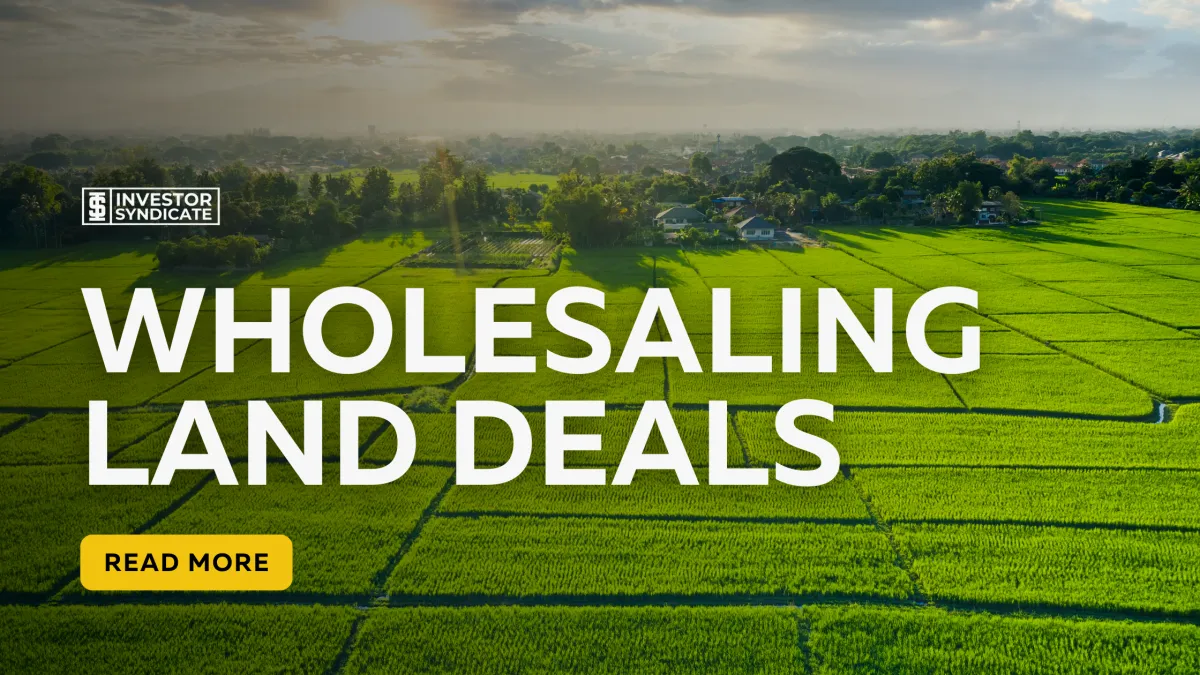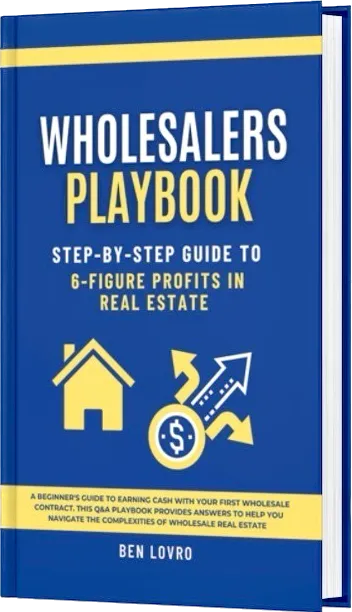Investor Syndicate Blogs
Download The Deal Flipping Playbook

Wholesaling Land Deals
Introduction
Investors are continually on the lookout for innovative approaches to optimize their returns. One such strategy that has garnered increasing attention in recent years is the practice of wholesaling land deals. This method involves the acquisition of undeveloped land at a substantially reduced cost, with the intention of reselling it to another buyer at a profit.

Notably, wholesaling land deals offer investors a unique opportunity to diversify their portfolios and capitalize on market trends. With its potential for lower entry costs and minimal holding expenses, this strategy has become a compelling choice for those seeking to maximize their investment returns in the dynamic real estate landscape.
Understanding Wholesaling Land Deals
Wholesaling land deals is a real estate investment strategy that revolves around acquiring undeveloped land at a significantly reduced price and then selling that land to another buyer at a higher price, thus generating a profit. While this investment method shares some similarities with traditional property wholesaling, it distinguishes itself by its exclusive focus on vacant land parcels.
The core principle of wholesaling land is straightforward: identify promising land deals, secure them at a favorable price, and subsequently transfer the contract to another buyer who is often a developer, investor, or individual interested in the land. This intermediary role allows wholesalers to profit without the need to develop or hold the land for an extended period.
One of the primary attractions of wholesaling land deals is its lower entry barrier compared to other real estate investment avenues. Traditional property investments often demand substantial upfront capital for purchasing residential or commercial properties. In contrast, land wholesaling requires a relatively modest initial investment, making it an appealing option for individuals with limited funds or those looking to diversify their investment portfolios.
Another significant advantage of wholesaling land lies in its minimal holding costs. Unlike developed properties, vacant land generally incurs fewer ongoing expenses. Landowners are typically exempt from expenses related to property maintenance, renovations, or property tax burdens. This cost-efficiency contributes to the appeal of land wholesaling as an investment approach.
Key Advantages of Wholesaling Land
Wholesaling land deals has emerged as a unique and increasingly popular investment strategy within the real estate landscape. This comprehensive exploration delves deep into the key advantages of wholesaling land, shedding light on why it has become an enticing choice for both seasoned investors and newcomers to the industry.
1. Lower Entry Costs
One of the most compelling advantages of wholesaling land deals is the significantly lower barrier to entry compared to other real estate investment methods. Traditional real estate investments often require substantial upfront capital for property acquisition, whether it be residential or commercial real estate. In contrast, land wholesaling allows investors to enter the market with a relatively modest investment.
This lower entry cost opens doors for individuals who may have limited funds but possess the ambition and dedication to enter the real estate investment arena. It democratizes the field, making real estate investment accessible to a broader demographic of prospective investors.
2. Minimal Holding Costs
When investors purchase developed properties, they inevitably assume the financial responsibilities associated with maintaining and managing those properties. These costs can encompass property taxes, insurance, utilities, repairs, and renovations, among others. Over time, these expenses can add up and erode potential profits.
In contrast, wholesaling land entails minimal holding costs. Vacant land typically does not necessitate ongoing expenses for maintenance or repairs. Investors can avoid the financial burden of property taxes and the complexities of property management. As a result, the profits generated from land wholesaling have the potential to be more substantial, as a larger portion of the sale price can be retained as profit.
3. Quick Turnaround
Land wholesaling often offers a quicker turnaround compared to other forms of real estate investment. Traditional real estate transactions, such as buying, renovating, and selling a house, can be time-consuming and may require months or even years to complete. In contrast, wholesaling land deals can often be finalized more expeditiously.
The rapid pace of land wholesaling can be attributed to several factors. Firstly, vacant land transactions tend to involve fewer complexities and fewer parties, streamlining the process. Secondly, the absence of structures on the land eliminates the need for inspections or renovations, further expediting the sale. Lastly, motivated land sellers are often eager to close deals swiftly, presenting investors with opportunities for quicker profits.
4. Lower Risk
Risk mitigation is a critical consideration for any investment endeavor, and wholesaling land deals offer certain advantages in this regard. While all investments carry inherent risks, land wholesaling can be less risky than other real estate ventures.
The reduced risk in land wholesaling is partly attributable to the lower holding costs. With minimal ongoing expenses, investors are less vulnerable to financial strain if the market experiences fluctuations. Additionally, the absence of structures means there are fewer variables to consider, reducing the likelihood of unexpected and costly repairs.
Moreover, since land wholesalers typically do not take possession of the property physically, they are not responsible for issues that might arise after the sale. This lowers the potential legal and financial liabilities associated with the property.
5. Diverse Investment Opportunities
Land wholesaling provides investors with a broad spectrum of investment opportunities. Vacant land can be found in various locations, each with its unique potential for growth and development. Investors can target land parcels in urban, suburban, or rural areas, depending on their preferences and investment strategies.
Furthermore, land wholesaling is not limited to a specific type of land. Investors can explore opportunities in residential, commercial, agricultural, or recreational land, among others. This versatility allows investors to diversify their portfolios by incorporating different types of land assets.
Steps to Successful Land Wholesaling: A Comprehensive Guide
Wholesaling land deals has emerged as a promising avenue within the real estate investment landscape, offering investors the opportunity to generate substantial profits with lower capital requirements and reduced holding costs compared to traditional property investments. To embark on a successful journey in land wholesaling, it's crucial to understand and meticulously execute each step of the process.
Step 1: Market Research
Successful land wholesaling begins with a deep understanding of the market. Investors should thoroughly research and analyze the local real estate landscape to identify promising opportunities. This involves studying market trends, assessing the demand for land, and understanding the preferences of potential buyers.
Market Trends Analysis
Investors should keep a close eye on current market trends. By monitoring factors such as population growth, economic development, and infrastructure projects in the area, they can identify regions with increasing demand for land.
Demand Assessment
Understanding the demand for land in a particular location is vital. Factors such as proximity to amenities, schools, employment centers, and recreational areas can influence demand. Investors should target areas where land is in high demand, as this often translates to higher resale values.
Buyer Preferences
Different buyers may have varying preferences when it comes to land use. Some may be interested in residential plots, while others may seek land for commercial or agricultural purposes. Investors should align their land acquisitions with the prevailing preferences of potential buyers.
Step 2: Lead Generation
Once investors have a clear understanding of the market, the next step is to generate leads. Effective lead generation strategies are essential for connecting with motivated sellers who are willing to part with their land at favorable prices.
Online Marketing
Investors can harness the power of online marketing to reach a wider audience. This includes creating a professional website, utilizing social media platforms, and advertising land listings on real estate websites.
Direct Mail Campaigns
Direct mail campaigns involve sending targeted mail to potential land sellers. These campaigns can include letters, postcards, or brochures that highlight the benefits of selling their land to the investor.
Networking
Building a network within the real estate industry can yield valuable leads. Attending local real estate events, joining real estate investment groups, and connecting with real estate agents can provide access to potential land deals.
Step 3: Due Diligence
Before finalizing any land acquisition, thorough due diligence is essential. Investors must ensure that the land they are considering is suitable for resale and free from any unexpected issues.
Zoning Regulations
Understanding local zoning regulations is critical. Investors should verify the zoning of the land and confirm that it aligns with their intended use or resale strategy.
Utilities and Access
Access to utilities such as water, electricity, and sewage is crucial for land value. Investors should assess whether these services are available on or near the property. Additionally, confirming legal access to the land is essential.
Environmental Considerations
Environmental factors can impact the land's suitability for resale. Investors should assess whether there are any environmental restrictions, protected areas, or potential hazards that could affect the property's value.
Step 4: Negotiation Skills
Negotiation is a fundamental skill in the land wholesaling process. Investors must be adept at securing land at a price that allows for a profitable resale.
Price Negotiation
Negotiating the purchase price is a critical aspect of land wholesaling. Investors should strive to secure the land at a price that aligns with their profit margin goals. Skilled negotiation can lead to significant savings.
Seller Motivation
Understanding the motivations of the seller can provide an advantage during negotiations. Sellers facing financial challenges or those eager to move quickly may be more willing to negotiate favorable terms.
Step 5: Profitable Resale
The ultimate goal of land wholesaling is to resell the acquired land at a profit. Investors should carefully consider their resale strategy, taking into account market conditions, buyer preferences, and pricing strategies.
Market Timing
Choosing the right time to resell the land can significantly impact profitability. Investors should be attuned to market conditions and aim to sell when demand is high and prices are favorable.
Marketing Strategy
Effectively marketing the land is essential. High-quality photographs, detailed property descriptions, and strategic pricing can attract potential buyers and lead to a faster sale.
In conclusion, wholesaling land deals presents a compelling opportunity for real estate investors seeking to diversify their portfolios and maximize returns. By understanding the intricacies of this strategy, conducting thorough market research, implementing effective lead generation techniques, performing due diligence, and honing negotiation skills, investors can navigate the world of land wholesaling with confidence. As with any investment, success in wholesaling land deals hinges on a combination of strategic planning, market knowledge, and the ability to seize lucrative opportunities.
Contact Us

Bet On Yourself
Empowering real estate investors with the tools they need to scale.






